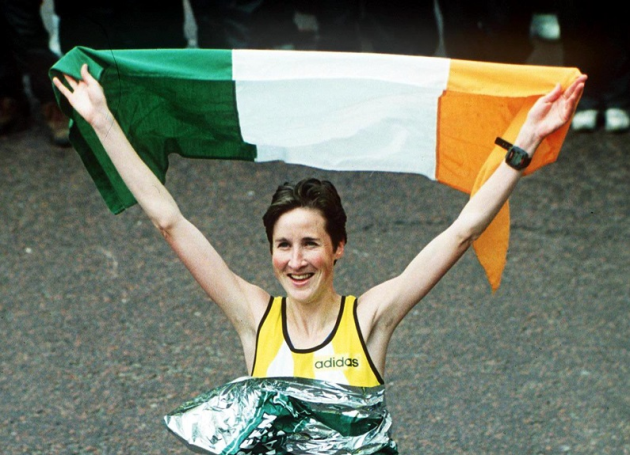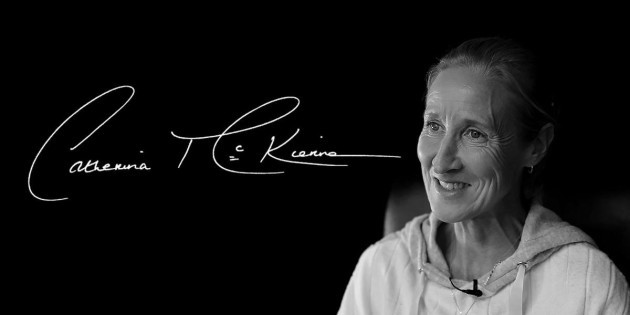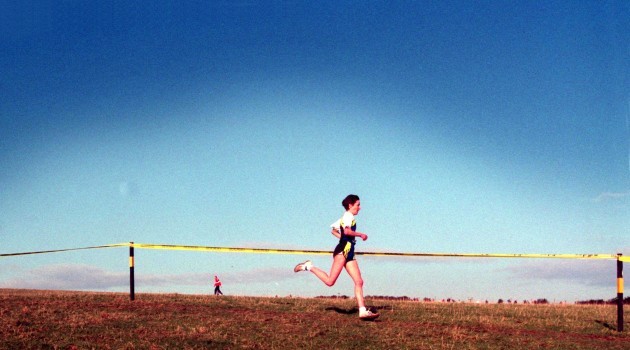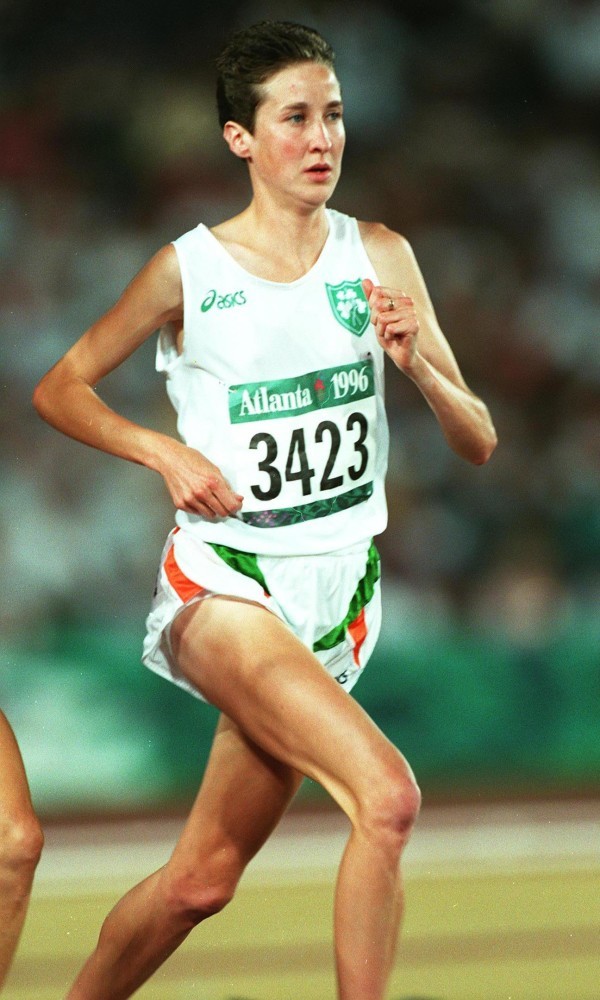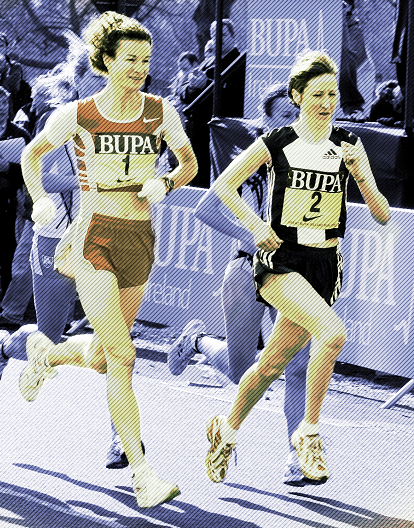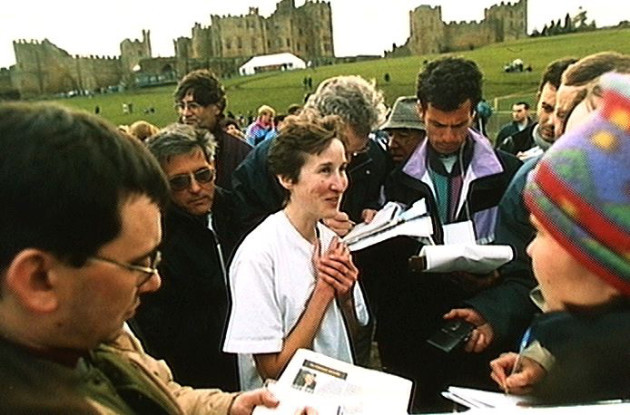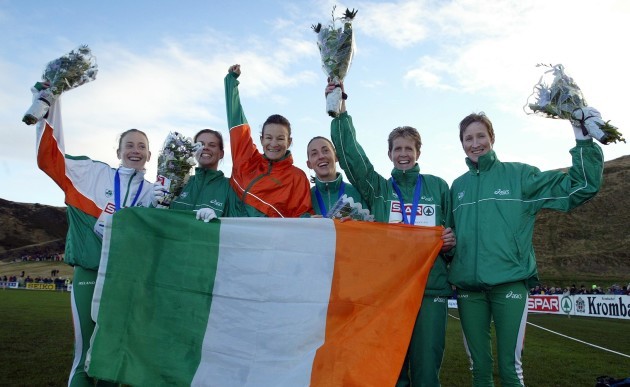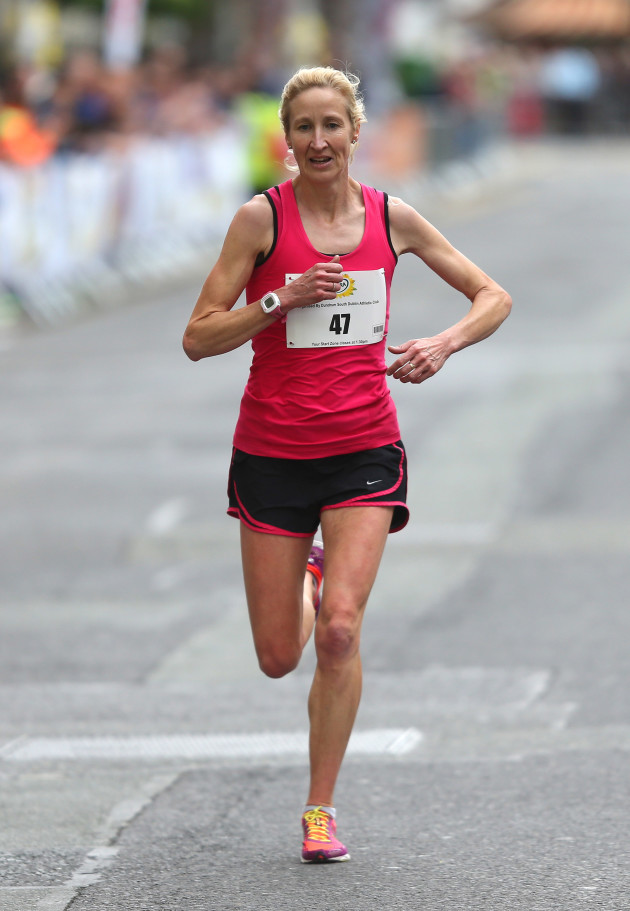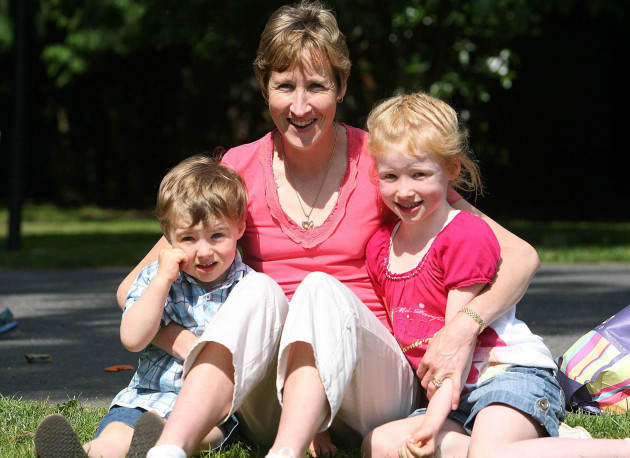BIRTHDAY (NOUN): THE anniversary of the day on which a person was born, typically treated as an occasion for celebration and the giving of gifts.
***
An occasion for celebration, yes, but as many get older, they’d rather not celebrate.
“I got my first birthday card today and I said to my daughter there, ‘I’m not sure if I want to be putting that up anywhere,’” Catherina McKiernan laughs, in conversation with The42 on Tuesday evening.
One of Ireland’s greatest-ever athletes turns 50 today.
“Ah, it’s all good. It can be a new phase. Somebody could ask me how I feel about it. Deep down, what do I feel?”
She thinks for a few seconds.
“I can allow myself to be a little bit more easy on myself, a little bit more relaxed with myself. That’s the answer I would give. The ultimate thing is to enjoy.”
This comes in the latter stages of our phone call, and nicely wraps up an incredibly open and honest conversation in which McKiernan delves deeper into a range of topics she has never spoken publicly about before.
“When you get older you reflect on things,” she explained beforehand. “Wisdom gained is never lost. Looking back, I feel I did a lot of my running for approval. This wasn’t good.”
She’s very thankful for her colourful career and wonderful achievements. She’s grateful for all of the help and support from family, friends and everyone else along the way.
She has just gained a new perspective on life over the last short while.
“I would have been still looking for that approval from people. It’s not healthy, it’s not a good way to be living. I’ve realised that.
“With age and with time, I have realised myself in myself. I have found a good release from it. Our happiness is our true nature, and I think we all deserve to be happy in anything that we do in life.
“If we continue to look for that approval, it’s hard work. It really is hard work.”
***
There’s no doubt about it, Catherina McKiernan was born to run. The title of her autobiography, Running for My Life, says it all.
Her recent realisations double down on that: she loved to run, but didn’t have quite the same love for things that went along with it. She’s most at ease talking about the simpler times. The days before her career took off.
Back home in Cavan, McKiernan grew up on the farm and was the youngest of seven.
“I just ran around the fields at home. I don’t really know why I went out, to be honest,” she begins, and you can almost hear her smile down the phone. “I suppose it was just that feeling of well-being.
“From a young age, I loved the feeling of freedom and confidence that running gave me.”
Memories roll back of winter evenings when it was too dark and wet to go outside, so she would just run on the spot for 40 minutes or so. A talented camogie player too, McKiernan had absolutely no ambition to run races in her early teens.
But then it just happened.
“You know the way sometimes sportspeople are interviewed after they win a big event, and they say, ‘I dreamt about this all my life?’” she asks. “It wasn’t something I had dreamt about. I just did it because I loved running.”
An athletics club started up in her final year of secondary school, and that’s what got the ball rolling for 18-year-old Catherina.
She shot to prominence in 1988 after winning the All-Ireland Schools Cross Country crown. That win, paired with a few Ulster title successes, led people to take notice of this rising teenager from Cornafean.
Never mind the four successive silver medals at the World Cross Country Championships, the European gold in 1994, the Olympic appearances or the endless stellar marathon achievements; it’s that ’88 Schools XC in Dungarvan that springs to mind first when she’s asked for career highlights.
“It was all steps,” McKiernan smiles. “It was all a gradual progression. When I won the All-Ireland schools, that was my first big day. It was simple. I was running in my bare feet.”
But it’s not just the race itself that throws up fond memories, it’s everything that went along with it.
How her father collected her from school on the Friday evening and waved her off to Dublin from Cavan Bus Station. How she was staying the night with her sister in The Big Smoke, and how the dinners her mother had sent up for them stunk out the bus. How her brother, Peadar, drove them down bright and early on the Saturday morning, taking every backarse road in the country to get there, all the while jumping out of the car to take pictures of every nice view or sight he noticed with his new camera.
The journey home was equally as eventful, the same story with the picture-taking all the way back to Cornafean, buoyed by the chat and excitement around the gold medal. In the midst of it all, they went astray and landed in Cashel, calling in to a friend of Peadar’s for a feed of rashers and sausages.
“Those sort of things, the simplicity of the whole lot, they were the things I enjoyed,” McKiernan nods. “The more serious stuff was a little bit more off-putting for me.”
She was destined for the more serious stuff, though. Destined for the world’s biggest stages.
***
Her recollection of the day is as clear as if it was yesterday. The day she first met her long-term coach, Joe Doonan.
As word got around of this young McKiernan girl and her running exploits, everybody in the area wanted to help. The local priest knew Doonan from college so he got in touch.
And an arrangement was made that she would call to his house one Friday evening. Her sister came along for moral support.
“I remember the evening well,” McKiernan grins now. “I still get a nervous feeling when I think about it. It wasn’t easy as I just was very shy and I didn’t really like talking to adults very much. My sister was good though, she broke the ice a little bit.”
The fact that Doonan was the principal of the local primary school likely added a bit of extra fear, with teachers much stricter back then. But fortunately, for the teenage sensation, all went well.
Doonan had seven children himself, some of them around her age, so he understood.
At the time, McKiernan’s ‘training’ had no structure whatsoever. “I was just running when I felt like it, just running up and down the hills.”
Like she always had. But Doonan soon knocked a bit of shape into it all.
Every Sunday evening after that, she rang him to get her weekly schedule.
“I didn’t like Sunday evenings for two reasons; one because school was the next day and because I had to call Joe,” she concedes. “That was certainly nothing got to do with Joe.
“It’s just that I was so shy and ringing a school teacher was certainly out of my comfort zone. I loved running and I knew Joe was a good coach, so I had to get out of my comfort zone and do what it took.”
As her brother Peadar often said, Catherina would go through a brick wall to go running, but she was so shy in other ways.
In the initial stages of working under Doonan, there was no huge change. The schedules were a guideline, but McKiernan would always do more. She didn’t have to meet her coach, so he never had to know.
“I could do more if I wanted to, he didn’t really know so it didn’t matter,” she laughs. “I might tell him that I did a little bit more but I didn’t tell him that I did a lot extra.
“I wasn’t restricted in what I was doing. He knew from my personality that I was going to do what I was told anyway, but he didn’t know in the early days that I was even doing more again than that.”
She adds: “Things progressed fairly quickly. I began to win more and more; senior All-Ireland titles, and then represented Ireland and was able to win abroad as well.
“It just took off from there.”
***
But the more things change, the more they stay the same.
You’d imagine it was quite weird for McKiernan going from doing her own thing with no structure to having a coach and a stricter schedule, first of all — and then to find herself competing on the biggest stage.
But she took it all in her stride at the start.
“In the earlier days, my relationship with running didn’t change,” she says. “I always loved to run regardless of where I finished in a race. I knew the next day I was going to run anyway so it didn’t really matter. It was just the run that I loved.”
She delves a little deeper as the feelings come flooding back, as raw as they were as she crossed the line.
“I did like racing but I suppose, ultimately, I liked winning. I liked that feeling of winning. Because I didn’t want to let people down. I had so much support and that, it was a horrible feeling when I didn’t win and I didn’t want to experience that feeling.
“I had the ability to push myself, and overcome the discomfort so that I wouldn’t feel that feeling of defeat.”
But to get a greater sense of Catherina McKiernan, the athlete, we discuss another career highlight.
One that really catapulted her onto the world stage: her second-place finish at the 1992 World Cross Country Championships in Boston, the first of the four silvers.
“That was a surprise and nobody really expected it,” she beams. Well, not nobody. Doonan did. The duo headed Stateside a few days early and there, they stayed with John Treacy. Then, disaster struck.
“Joe’s mother was ill and he had to actually go home before the race because they thought she was going to pass away,” the 50-year-old recalls. “I remember before he left, he said, ‘You’re in good enough shape to win a medal, but don’t say anything to anyone.’
“That gave me a lot of confidence.”
Another off-course story springs to mind on that. It’s all about the simple things with McKiernan. The pub back home did a draw, and the prize was two tickets to Boston for the main event.
“This old man was picked out, and his daughter, but the old man didn’t have a passport,” she giggles. “The rush then… there was nothing about me running the race in Boston or anything like that, the whole talk in the area was, ‘Will he get his passport in time?’
“It’s those simple little stories, that’s what gave me a lot of joy. Knowing that other people were getting joy out of it. Simple things like that.”
And McKiernan was surely more than happy to be out of the limelight.
***
Luck was working in my favour when Sonia O’Sullivan was put on the planet the same time as me. We were born only two days apart. I was fortunate she was around.
I wanted to beat Sonia, and she wanted to beat me, and that’s natural whether she was from Ireland, France, Germany or Portugal it made no difference. It was friendly competition, but it was never a rivalry.
- Catherina McKiernan, The Sports Chronicle, October 2019.
She’s said it before, she’ll say it again: despite all the attention it got, it wasn’t a rivalry.
“From my point of view, it was more a respect thing,” McKiernan says, “because I knew when Sonia achieved what she did and all the great things that she achieved, she worked bloody hard to do that.
“I wouldn’t have achieved as much as… look, Sonia could be asked the same question — there wasn’t any rivalry because we knew we worked hard to achieve what we did.
“I was thankful because she probably did me a favour. I didn’t like all that publicity and it took the limelight off me. I could just go about my business and do my training knowing that it wasn’t just me that was the main focus. There was two of us in it. If it was just one of us, it would have been a hell of a lot more pressure.”
It is crazy to think that these brilliant athletes who dominated the Irish athletics scene in the 1990s and early 2000s were born just two days apart, though. And that surely added to the whole rivalry picture the media did their best to paint.
McKiernan stresses that it was never something she really thought about. As an athlete, you’re selfish, and her entire focus was on getting the best out of herself. She trained as hard as she possibly could — so much so that she couldn’t run another step — and ensured that she could race as fast as she possibly could on the day.
Tunnel vision, of sorts. Catherina was only concerned about Catherina.
“I didn’t fear any of the opposition,” she explains, adding that she didn’t get into any detail with them. And it was the same with Sonia. She was doing her thing. It was a mutual respect in an individual sport, because everyone knows just how hard it is.
Catherina was Cross Country Queen, Sonia that of the track.
McKiernan fully understands how passionate the journalists covering ’the rivalry’ at the time were. While friendly with them all, she acknowledges they were all doing their job. As she was, too.
“It was just the pressure, particularly before races, the headlines that maybe I was in great shape. You don’t want that sort of thing, you just want to be focused.
“As I often said, let my legs do the talking rather than having the pressure of media coverage beforehand.”
While she accepts that it comes with the territory and it was something she had to do, it was never something she associated with running.
***
Bringing joy to others was most definitely what she thrived on. And of course, her love for running. Running, alone.
And when she didn’t bring joy through her performances, she felt like she failed.
“I hated that empty feeling of defeat,” she frowns, retracing the roots of her competitive edge. It wasn’t exactly that, though.
“I suppose thinking back, and in recent times, as I’ve said, a lot of it was for the approval. A lot of what I did was for the approval. That was always there. In training it was there, and that’s why I had the ability to push myself hard in training.
“I knew if I could push myself then I was going to get better. I didn’t want to experience that feeling of…. look, that can be normal enough. In ways, it was to my advantage because it meant that I worked hard to achieve.”
Bloody hard, just like Sonia did.
She stresses how grateful she is for everything her career has given her time and time again, but just recently she’s realised that that approval from others was at the core of it all.
“I had a lot of support from family, everyone in Cornafean, Cavan and around the country,” she continues. “I had sponsored cars, company sponsorship and a gear sponsor. I was a professional athlete, something I hadn’t planned.
“This was all great and something I am very thankful for. These were all a driving force and helped me push through training and racing.
“A lot of people from Cavan came to my races abroad and I certainly didn’t want to be sitting on the plane home with them unless I got on the podium.”
She found that difficult to deal with, the feeling of letting others down.
“The thoughts of sitting with the people back on the plane all the way home and not having a medal around your neck, that was scary to me,” she reiterates.
“In the final lap or final mile of a race, although I was in the zone, at the same time those people were in the back of my mind, and the sponsors and all of that sort of thing, the people that helped me out.
“I had to prove myself to them and that was hard work, to be honest. I’m not sure if it’s a healthy way to be living life either.”
At the time though, she was so caught up thinking about the next race, the next session, the next time, the next record. For more momentary approval. With every high comes a low.
She was aware of it back then — she recalls a brief conversation with Doonan where she flagged it, though they left it at that — but like Peadar had said, Catherina continued to run through brick walls.
“It’s not all rosy. I remember Brian Johnson, my manager in the county council office at the time — I just got very tired from training and racing and all of that, and I remember the words he said: ‘Catherina, rest and smell the roses.’ When you’re that age, you don’t want to do that either.
“Then the fact that you have all the sponsorship and that, that’s pressure too. It was never the way I would have thought it would be. It wasn’t something I associated with running.
“What I associated with running was fun and joy, not all the pressure and all of these interviews and all of that sort of stuff. That comes with the territory though all the same. I had to do it.
“My background and my personality as such, I didn’t really like that. I knew that it wasn’t my true self either.”
***
Gratitude is important in life, and McKiernan is grateful for both the good and the bad. It all shaped her into the person she is today.
Perhaps one of her most memorable days in the sun was the 1998 London Marathon. A year after triumphing in Berlin — and clocking the fastest-ever debut time in a marathon for a woman — she became the first Irish person to win the London Marathon.
The Irish marathon record holder (2:22.23, recorded in her Amsterdam win) remembers that April day in the English capital with great fondness. But again, for other reasons than the race itself.
“My mother, she couldn’t watch any races whatsoever,” McKiernan smiles. “She would be out the back with the rosary beads saying her prayers.”
But she was there in London, — the entire family were, minus one brother who had to stay at home on the farm — happy in the knowledge that she wouldn’t see much of it as her daughter just ran by in the middle of the 26.2-miler.
“I was at home this year while the London Marathon was on,” she says. “We just had it on the telly on the Sunday morning. I said to her, ‘What did you do during the race?’ She says, ‘Well I went to mass…..’
“I didn’t actually know until this year that she found a church and got mass. That killed a little bit of time anyway!
“Look, it was the simplicity of it. We didn’t really talk very much about it at home at all.
“I remember my coach, he was great at keeping the lid on things and not making a fuss or anything like that,” McKiernan adds.
“I remember he’d come into the house for a cup of tea before a big race and my father would ask him, ‘Well, how is she going?’ He’d say, ‘Ah, she’s flying like yourself!’ He’d give away nothing at all, which was good.
“I think that’s a little bit of a problem nowadays. With social media, there’s no hiding place for our sportspeople. There’s too much pressure put on them, which can’t be easy.”
***
Athletics on these shores is thriving at the minute, but now, McKiernan is more than happy to have left it all behind her.
“Look, there has to come a time, to be honest,” she states. “Been there, done that, and you just let it go. I like to be able to run still, to go for runs and that, but you have to be realistic. You have to be sensible, you have to be grateful and thankful for all that I did achieve.
“Nobody keeps going forever. It is a short window as well. You only have so many years at that high level, and to be able to put in the commitment and the dedication over that time.
“Our athletes are doing the best that they can. It’s tough on them if they don’t perform well — I know myself, things didn’t always work out. We never mean to go out to run a bad race. But that’s the problem, you’re criticised, and that’s difficult to deal with.
“All our athletes, they go out there to do their best and try their best, and I think people should respect that.”
And while she’s at peace with the fact that it’s all over now, letting go wasn’t exactly easy.
“I know that a lot of sportspeople find it hard to let go, but to be honest, that’s the reason you can call it egotistic or you can call it personality, you can call it what you like. But at the end of the day, the reason why we don’t want to let go is because we’re not getting that approval anymore.
“That was a big eye-opener to me. For me, at different stages, I was finding it difficult to let go but then when I realised, ‘Okay, I’m doing this on myself, this is a little bit of my personality or ego or whatever, I can cope with this, I can deal with this, I can overcome this…’ That is all that it is really: me looking for approval.
“When you think of it like that, it’s not healthy to be living like that. We are good as it is, we don’t need approval from anybody else. Nobody does. I’m not even saying in sports terms, I’m saying in life in general — our true self is good, is kind, is loving, is all of those things.”
“When you strive,” she continues, “again, I’m not even just talking about sport but anything in life — and when you desire things, we’re working against ourselves. Whereas if you just allow them to happen, they’re going to happen more naturally.”
***
“Maybe it might help other people that are finding it difficult to let go,” she concludes, and you can just tell she feels better for getting certain things off her chest.
“There’s a long time after your career. As I said, it’s only a short window and the ultimate thing for everyone is to be happy.”
Her pure love for solely running shines through with every word, and that’s put to her.
All the other bits that come with it…
“Were a pain,” she interjects, laughing and joking. But realistically, she’s not.
“I’ve done the full circle in that now I can go out for a run in the park and just enjoy it. What I’m doing now with the running classes, with groups of people — these are just ordinary people, 5ks, 10ks, some of them run marathons, they’re not elite athletes.
“I like dealing with those people because they just want to experience that joy of running, and that feeling of well-being that running gives them. I can associate with that, and that’s why I feel good doing that.
“Running is meant to be enjoyed, not endured,” as she said before. While she did love it — the training and the racing — she admits that, yes, there were times in her career when she was just enduring.
“It evolved in that way, and there was nobody to blame for that only my own success. When you’re successful, people want to come on board and help you. But then that as well is pressurising.
“But in saying all of that, I had some great success, I gave people a lot of joy. That’s for sure. I met some fabulous people along the way, learned a lot, and learned a lot about myself from it. There’s a lot of positives to it as well, I must say. It’s something that I’m grateful for and thankful for.”
***
While the ultimate thing for everyone is to be happy, as she says herself, you get the sense that Catherina McKiernan is just that now.
While there’s no denying how difficult letting go was at times, her beloved children were a huge part in helping her through that. Deirbhile (17) and Patrick (13) are her pride and joy, and that’s clear as day.
She thoroughly enjoys motherhood, and took great pleasure in witnessing each and every one of the different stages of them growing up: “They have very different personalities and I really enjoy them,” she notes — again, you can almost hear her smiling down the phone.
“They teach me a thing or two!”
But McKiernan has certainly taught herself an incredible amount, too.
And this writer. And now surely the readers of this piece.
“Our true self is the real self,” she reassures, as our thoroughly enjoyable conversation draws to a close. “I say there’s two selves. There’s the small self — the personality — but that’s not what we should be working from because that makes us very disappointed, often sad, and can bring us heartache.
“But in every single one of us there is a much deeper part… the true self. If we think of our true self; which is all perfect, all good, all happy, all loving, all of those things; if we can kind of focus in on that, then life is much nicer and much smoother.”
“Happiness does not live in fame or fortune,” McKiernan concludes.
“The true self is everything and when we learn to live from there, we will be happy.”
The42 is on Instagram! Tap the button below on your phone to follow us!
